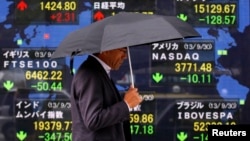World stock markets are reacting calmly to the partial shutdown of the U.S. government.
Asian markets ended mixed Tuesday, while key indexes in Frankfurt and Paris advanced more than 1 percent. U.S. markets edged higher in afternoon trading in New York.
The value of the U.S. dollar, however, slid against world currencies, on fears that the first shutdown of the U.S. government in 17 years could prove to be a drag on the slowly improving American economy, the world's largest.
One market research company, IHS estimated that the work stoppage at many U.S. agencies and the furloughing of 800,000 government workers would cost the U.S. economy at least $300 million a day in lost economic output.
Analysts say the effect of a short shutdown might be relatively small on economic growth. But one U.S. economist, Jim O'Sullivan of High Frequency Economics, said the impact could worsen if the shutdown extends for more than a few days.
"The more time that elapses, the more disruption there will be. But I think markets are forward looking. We've seen this before, to some extent. At the end of the day, it's just not going to be a huge factor for the economy," said O'Sullivan.
Consumer spending accounts for about 70 percent of the U.S. economy. The analysts say U.S. economic fortunes could be more broadly impacted if fears persist that the White House and Congress cannot reach an agreement to end the stalemate over government funding and the implementation of President Barack Obama's signature legislative achievement, health care reforms that are now taking effect.
World markets appear most concerned with whether Congress and Mr. Obama can reach an agreement to increase the country's $16.7 trillion borrowing limit. The U.S. is expected to reach the debt limit by October 17, at which point the country could run out of money to pay all its bills. The country, for the first time, could default on its financial obligations, including payment on bonds held by overseas investors.
Numerous political and economic analysts say a U.S. default would likely roil world financial markets. But O'Sullivan said he does not think that Washington is so irresponsible it would allow the country to default.
"We've never not met our obligations....the debt limit will be dealt with," he said.
Asian markets ended mixed Tuesday, while key indexes in Frankfurt and Paris advanced more than 1 percent. U.S. markets edged higher in afternoon trading in New York.
The value of the U.S. dollar, however, slid against world currencies, on fears that the first shutdown of the U.S. government in 17 years could prove to be a drag on the slowly improving American economy, the world's largest.
One market research company, IHS estimated that the work stoppage at many U.S. agencies and the furloughing of 800,000 government workers would cost the U.S. economy at least $300 million a day in lost economic output.
Analysts say the effect of a short shutdown might be relatively small on economic growth. But one U.S. economist, Jim O'Sullivan of High Frequency Economics, said the impact could worsen if the shutdown extends for more than a few days.
"The more time that elapses, the more disruption there will be. But I think markets are forward looking. We've seen this before, to some extent. At the end of the day, it's just not going to be a huge factor for the economy," said O'Sullivan.
Consumer spending accounts for about 70 percent of the U.S. economy. The analysts say U.S. economic fortunes could be more broadly impacted if fears persist that the White House and Congress cannot reach an agreement to end the stalemate over government funding and the implementation of President Barack Obama's signature legislative achievement, health care reforms that are now taking effect.
World markets appear most concerned with whether Congress and Mr. Obama can reach an agreement to increase the country's $16.7 trillion borrowing limit. The U.S. is expected to reach the debt limit by October 17, at which point the country could run out of money to pay all its bills. The country, for the first time, could default on its financial obligations, including payment on bonds held by overseas investors.
Numerous political and economic analysts say a U.S. default would likely roil world financial markets. But O'Sullivan said he does not think that Washington is so irresponsible it would allow the country to default.
"We've never not met our obligations....the debt limit will be dealt with," he said.










